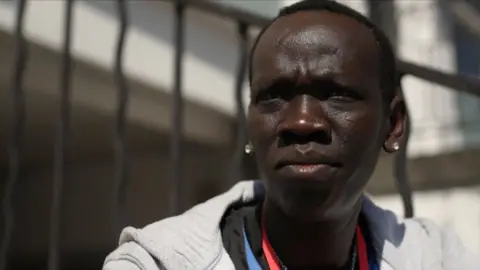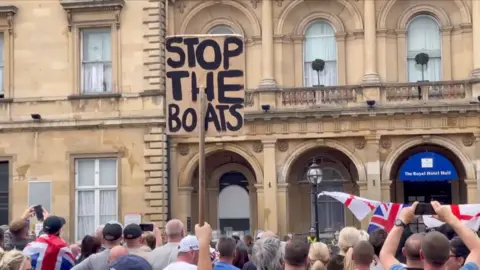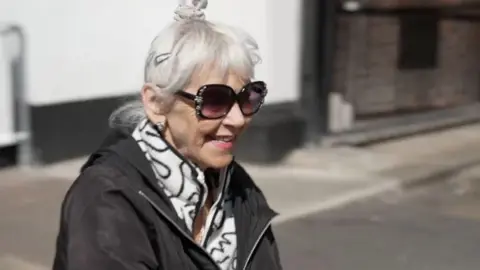Putting up asylum seekers in Hull's Royal Hotel still divides the city
 BBC
BBCTake the train to Hull, walk out of the station, and it takes just seconds to arrive at the Royal Hotel. It once hosted royalty - but for the past five years it's been home to hundreds of asylum seekers in the city.
From being a place of sanctuary, it became the frontline of last summer's riots, when windows of the hotel were smashed and asylum seekers hid inside. Outside the Royal, there was anger and rage.
The use of hotels to house people arriving on smalls boats from France represents one of the most divisive issues in Britain today. People have been telling the BBC what the hotel means to them.
Last July, Anei was living inside the Royal Hotel as riots took hold outside. He says he was terrified. "Everyone was scared," he adds. He tells us that he and others had to stay inside the hotel fearing that if they went outside "we die".
Anei is 27 and arrived in the UK on a small boat three years ago. He says his parents died in South Sudan and that he was given a choice to join a militia and fight, or be killed. He decided to flee.
He tells us he was beaten up in Hull and abused on the day of the riots. "They don't like the asylum seekers, they hit me in the back and I fell down," he says. He tells us one person shouted "you've come here and taken our jobs".
Why, I ask, does he think some people were angry with him? He says he doesn't know and that nobody has spoken to him about the realities of his life inside the Royal Hotel. He says he has taken no job.
But Anei has now been given the right to remain in the UK, he says he wants to work and pay back the UK for the help he's already received.

Home Office figures released on Thursday tell one story - that the number of asylum seekers being housed in hotels has fallen. But the number is still higher than when Labour came into power last year.
There were 32,345 asylum seekers living in taxpayer-funded hotels in March 2025, the figures show.
But there's also another story. Despite the repeated promises to end asylum hotel accommodation, it remains a defining issue for many people and in many places.
Not far from the Royal Hotel, we met Gaynor, who is whizzing around on her mobility scooter, wearing large black sunglasses. She's in her 70s now, but says she remembers the good times inside the Royal like it was yesterday. "The hotel was so beautiful," she says. "We used to go in there for drinks and cocktails."

Gaynor says it's a shame it has now been taken over and used as accommodation for asylum seekers.
"I do feel sorry for them," she says, "I know their countries are at war, but there's other countries they have to go to before they get to England - I don't think it's fair, I don't think it's fair at all."
It's an issue that's changed the way she votes. "Yes, I voted for Reform," she says. "I don't mind telling you that, something needs to be done."
Gaynor isn't alone in feeling like this, but there are other voices here too. One man who who lives within sight of the hotel, says it is important that asylum seekers are given accommodation while they are processed.
Outside the hotel, at a taxi rank in sight of the station, Shane was keen to chat. He works here a lot and showed us the video he filmed earlier this year. He witnessed an asylum seeker trying to kick out the windows of a room in the hotel, while holding what appeared to be a knife.
In the footage you can hear another taxi driver ask: "Why isn't anyone stopping him?" At the end of the footage Shane says: "So this is what asylum seekers think of a four-star hotel."
We don't know what happened to the person inside the hotel, but for Shane the video sums up his feelings of being powerless in his home city. "It's a case of shut up and put up, because you can't do anything about it," he says. "I know one or two armed forces lads who sleep rough on the streets, we're taking in the wrong people, it's so wrong."
About a mile or so out of the city we visited Danny Taylor, he set up Adapt Resettlement to provide emergency food and accommodation to people struggling in Hull. He houses around two dozen people, some have been long-term homeless.

"It's unfair," says Danny, "we get people through this door who have been homeless for 12 months, but people who come here they get a hotel, they get three meals a day, ours have food parcels - it's impossible to give them three meals a day."
Inside Adapt Resettlement, we met Robbie, he'd been long-term homeless and faced drug dependency. He's extremely vulnerable but happily showing off his food parcel of tinned vegetables and rice pudding. "I'm supposed to be on benefits and a 'free ride'," he says, using his hands to make quotation marks. "But the free ride isn't all that. I wish I was an asylum seeker, I'd have free accommodation."
Those same questions of fairness are also being asked inside Welcome House, a charity that supports asylum seekers in the city.
Its founder, Bashir Siraj - himself a refugee from Pakistan who arrived in the UK 20 years ago - says they had more than 20,000 visitors last year. He tells us he has support from many people in the city and the local council but is left dismayed when asylum seekers are blamed for living in hotels.
"Why are they attacking us? Why aren't they blaming the government, the policies?" he asks.
The Home Office told us the Labour government inherited an asylum system under unprecedented strain, and says it is beginning to restore order.
In a statement it said: "We will be able to end the use of asylum hotels over time and reduce the overall costs to the taxpayer of asylum accommodation.
"There are now fewer hotels open than there were before the election, with more due to close by the end of May."
